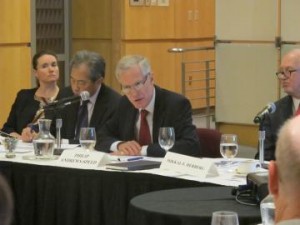 Philip Andrews-Speed gave a presentation on “China’s energy policy-making processes and their consequences” at the annual Energy Security Workshop run by the National Bureau of Asian Research (NBR), held in Washington D.C. on 5th June 2014.
Philip Andrews-Speed gave a presentation on “China’s energy policy-making processes and their consequences” at the annual Energy Security Workshop run by the National Bureau of Asian Research (NBR), held in Washington D.C. on 5th June 2014.
China’s new government has inherited or launched a number of important policy initiatives which directly affect the energy sector. These include the continued reduction of energy intensity and carbon emissions, the radical reduction of air pollution, and the reform of the state owned enterprises and of the pricing systems for energy products. Each of these policy initiatives involves quite different sets of strategies and these strategies possess differing characteristics relating to policy making, implementation and consequences.
The aim of this paper is to show how different types of energy policy initiative in China emerge from different policy contexts and policy-making processes, and to show how these different processes play a strong role on shaping the implementation and consequences of the policy initiative. This framework is then applied to selected recent plans and current policy programs in order to assess the likely trajectory and consequences of these initiatives. The paper starts by examining the prevailing policy paradigm which shapes China’s energy policies before presenting the framework just described. The paper then applies this analytical framework to five policy programs: air pollution control, oil and gas production, renewable energy, industry reform, and carbon markets.
The full paper will be published by the NBR later in 2014. The presentation can be downloaded here.

